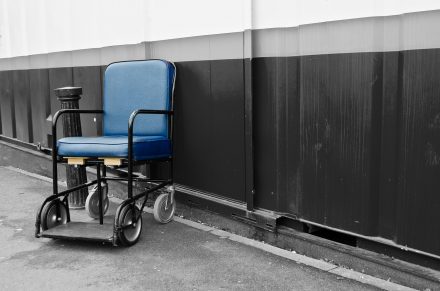Penalreform.org
Lana Giorgidze
I have been working in the nongovernmental organization Human Rights Center for seven years and have been studying the rights of the convicts in the penitentiary establishments.
Although there are a lot of issues which are under particular attention of the nongovernmental organizations and the Public Defender’s Office in Georgian penitentiary system, I would like to single out the rights of the prisoners with disabilities.
S.S is a probationer; his body is paralyzed below his chest; currently he is annoyed with the society and the government because he believes his right to medical treatment, health and just normal life was violated. He was serving his imprisonment term in jail hospital, and his life was under threat several times. He permanently waited for someone, who could help him to take a bath or take care, so that his imprisonment term was not inhuman and degrading for him.
Nowadays, S.S is a probationer. Nobody can assist him to go out; he lives together with his old mother and cannot travel abroad to take medical treatment there to mitigate his pains; if it happens, his mother too, would not have to look at the unskinned backbone of the son.
Unfortunately, S.S is not the only convicted person, who complained about unbearable conditions in the jail hospital. Akaki Tokhadze, who is also disabled, told me that he was absolutely healthy when he was placed in prison. However, difficult two years of psychological and physical violence made him wheelchair-user. When we are writing about the rights of the disabled people, there are standards which the journalists have to follow, and it includes to avoid writing the diagnosis in the publications; however, this time, I would like to tell you that Akaki Tokhadze, whose legs are absolutely paralyzed and hands only partly paralyzed, served his imprisonment term in unbearable conditions.
The jail hospital, where the disabled prisoners serve their terms, is not adapted; there are three beds in cells that creates problems for the disabled people. Sometimes, Akaki Tokhadze was not able to move around in wheelchair but it was not end of the problems. Akaki was complaining about the discomfort when taking a shower in the jail hospital and said that he could take shower only with the help of other prisoners. Because of unhygienic conditions his life was under risk; also his chair could slip and he could fell off. Although it was necessary to appoint a supporter for him, there were not enough and adequate personnel in the jail hospital.
Most prisoners preferred to serve their terms in jail hospital, where they could spend more time in fresh air. Akaki Tokhadze said the prisoners with health problems need to be in the fresh air more than others; however, because of disability, they spent most time in the cells.
Although the health conditions of Akaki Tokhadze are getting worse and worse every year, the law does not free him from imprisonment; his imprisonment term was postponed and unless he take next medical expertise in June 2020, which costs 1 500 GEL, (Tokhadze is socially indigent person), he will go back to prison. Moreover, similar fact already happened in 2019. Tokhadze told me with irony - the penitentiary system cannot live without him and tries to get him back. Because of the legislative miscarriage Akaki Tokhadze is going round a circle – from prison to prison and then from the beginning: expertise, answer, leaving prison and then still a risk and fear to go back to prison.
In accordance to the report “Human Rights of Life-long and High-Risk Prisoners in Penitentiary System”, the UN Convention on the Rights of People with Disabilities guarantees that the state is obliged to ensure the people with disabilities with equal guarantees under the international human rights law in case of their imprisonment and to apply the principles envisaged under the Convention.
In accordance to the Nelson Mandela Rules, prison administrations shall make all reasonable accommodation and adjustments to ensure that prisoners with physical, mental or other disabilities have full and effective access to prison life on an equitable basis.
In order for the principle of non-discrimination to be put into practice, prison administrations shall take account of the individual needs of prisoners, in particular the most vulnerable categories in prison settings.
In accordance to the joint report of the nongovernmental organizations, when decision is made to restrict freedom of the disabled person, the authority shall take particular care of these individuals to ensure that imprisonment conditions are coherent to their individual needs.
Regardless the recommendations of the nongovernmental organizations, people with disabilities still serve their imprisonment terms in degrading conditions. However, they note that when there is high public interest towards the disabled prisoner, the prison administration is particularly attentive to them.
Adapted environment, increased number of supporters in jail hospitals, possibility to walk in the fresh air every day, elimination of discrimination – these are major requirements of the prisoners with disabilities, which will enable them to have access to prison services equally, fully and without discrimination.
News
December 13, 2023
Ethnic minorities outside the peace dialogue
November 6, 2023
‘Peace’ agenda of political parties
Popular
Articles
February 13, 2024




